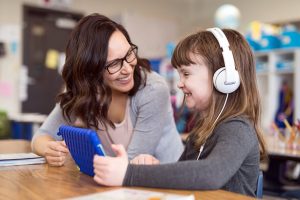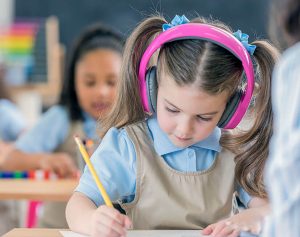Children with disability do best when parents and schools work together.
The main way this happens is through your child’s Student Support Group.
The Student Support Group (SSG) brings together everyone involved in your child’s education to plan supports and follow their progress.
The SSG looks at all aspects of your child’s learning and wellbeing. This includes their academic learning, social inclusion, safety, access to facilities, behaviour support, medical and personal care.
If your child has a disability or additional needs, you can ask the school for an SSG. All students on the Program for Students with Disabilities (PSD) must have an SSG.
At Catholic and Independent schools SSGs are called Program Support Groups (PSG). The information below also relates to PSGs.
What does the Student Support Group do?
- Deciding what reasonable adjustments are needed to meet your child’s needs
- If your child has funding, making recommendations to the Principal about how the funding is spent
- Developing your child’s Individual Education Plan
- Developing other plans to support your child’s behaviour, personal care or medical needs
- Communicating your child’s plans to teachers and staff
- Providing support to put your child’s plan into action
- Reviewing and monitoring your child’s progress
- Transition planning as your child moves from one setting to another
Members of group
Your child’s Student Support Group includes:
- You – as your child’s parent or carer
- Your child’s teacher/s
- The school Principal or a nominee
It can also include:
- A support person or advocate (if you choose to have one)
- Therapists (as agreed by the group)
- Your child (if appropriate)
The Student Support Group is a partnership where everyone brings their unique perspective and expertise. Your contribution is very important because you know your child best. Don’t be afraid to speak up, share your opinions and ask questions.
Other people in the group may offer different ideas about how to meet your child’s learning and support needs. Everyone should listen with an open mind. As your child gets older, they can also have a say in their own learning and on issues that affect them.
Good communication between all members of the group helps to create a shared understanding of your child. This will make sure the right plans and supports are put in place at school.
Student Support Group meetings
The Student Support Group should meet regularly, at least once each term. It’s a good idea to have a meeting early in Term 1 and to schedule meeting times for the rest of the year. You can always ask for an extra meeting at any time.
Most meetings are held face-to-face at school. But if your child’s school is a long way from home or you find it hard to get to the school, you can ask for a phone discussion or a meeting using Skype.
Bringing a support person or advocate
You can bring a support person or advocate with you to any meetings with the school. They cannot make decisions for you, but they can give you emotional support, help you to understand information or provide expert advice.
Keeping records and following up
The school should give all members of the Student Support Group an agenda for the meeting before you are due to meet. Minutes should be taken during the meeting to record all decisions and agreed actions. The minutes should be given to everyone in the group as soon as possible after the meeting. The school should keep a copy of the minutes on record.
Much of what is discussed in the meeting will be used to develop or update your child’s Individual Education Plan, and any other support plans.
It’s important to follow up on agreed actions to make sure they have been done, or to find out if a decision needs to be reviewed or changed.
If things aren’t working well
If you find that Student Support Group meetings aren’t working well, you can ask the group to review its own processes and find ways to do things better. Discussion might include:
- Communication in between meetings
- Meeting organisation, agendas and minutes
- Follow-up on agreed actions
- Communicating decisions to other teachers and staff
Acknowledge the emotions
SSG meetings can bring up lots of emotions as you discuss how your child is going at school. Take care of yourself before and after the meeting.
Celebrate success
Student Support Group meetings are also an opportunity to acknowledge and celebrate your child’s progress. Positive feedback lets the group know what is working well and contributes to a shared understanding of your child. All of your child’s achievements are worthy of praise and celebration.
Useful links
Student Support Group Guidelines
Parent Guide to Program Support Groups






